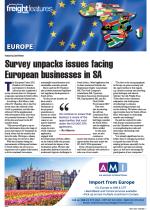Bi lateral trade between Europe and the Western Cape has seen exceptional growth over the past two years, increasing by 11% and 21% in 2020 and 2021, according to Wesgro CEO Wrenelle Stander.Europe is currently the Western Cape’s top export market by region, overtaking Africa in 2020. In 2021, the Western Cape exported R51.84 billion worth of goods to Europe, which accounted for about 31% of the province’s total exports. Furthermore, approximately 24% of Western Cape’s imports in 2021 were from Europe, amounting to R55.45 billion. Total bilateral trade between the Western Cape and Europe was valued at R107.29 billion in 2021.“This is a rising trend,” said Stander. “On average, the province’s total exports to Europe have increased at the rate of 9% over the past decade. The growth rates of exports were 29% and 10% in 2020 and 2021 respectively. Imports, on the other hand, increased by 32% in 2021, compared to the contraction of -4% recorded in 2020.”She said priority countries for Wesgro’s export promotion efforts were Netherlands, G er many, Spain, Italy and France. “These markets are not only the current top EU export countries from the Western Cape, but have also been identified as holding the largest export potential based on an independent product complexity map study commissioned in 2021.”The focus areas for exports to the EU were agriculture, agri-processing, services, natural ingredients, boatbuilding and cosmetics. “European consumers are placing an increasing emphasis on natural products, environmental sustainability, and the protection of biodiversity – and the Western Cape has a strong suite of niche products that meet such demands,” said Stander.Highlighting the importance of the region, Stander said Wesgro's export unit would execute at least 10 export missions into the region in the 2022-2023 financial year.According to Stander, there are some challenges in trading with Europe, with exporters identifying logistics as one of the biggest issues. “These logistics challenges impact on the timeous route to market and have particularly related to efficiencies at the Port of Cape Town, which were exacerbated by global supply chain challenges. More recently, as a result of the conf lict in Ukraine, exporters indicated increased congestion at EU ports, resulting in further delays. Additionally, there is pressure on prices, as global producers are trying to divert their products into new markets, leading to oversupply.”Stander said they were also expecting to see an increase in compliance costs as the EU moved towards implementing the European Green Deal, which includes a set of policy objectives and initiatives designed to ensure that all sectors across the EU economy contribute to the achievement of the EU’s climate targets. These include the immediate target of at least a 55% net reduction in greenhouse gas emission by 2030

